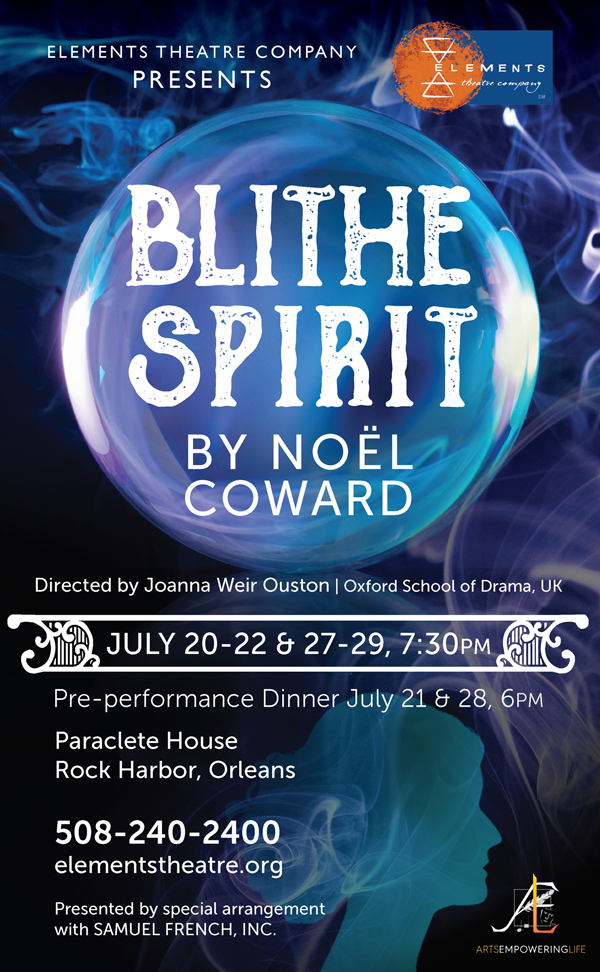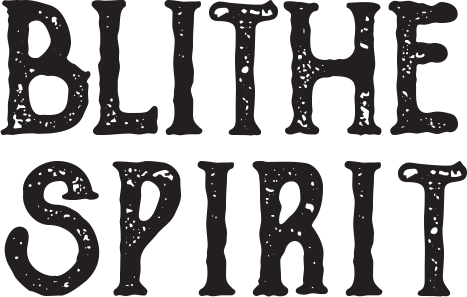
Show Information
From the Director
Show Gallery

From Guest Director, Joanna Weir Ouston
Welcome to our production of Noël Coward’s Blithe Spirit. By the time he wrote Blithe Spirit, Coward was a very successful and prolific writer. Incredibly, he wrote the play in only six days in 1941 at the height of World War II. There were no subsequent re-writes, and only two lines were cut from that first draft in the original production which premiered just six weeks later.
In 1941, bombs were falling on London and fear of Nazi invasion gripped the country, so Coward decided to write a comedy to lighten people’s hearts and provide a happy distraction from the turbulence and distress of the times. Surprisingly, he chose death as a central theme, shocking a handful of critics but impressing most who thought it was a stroke of daring and genius to write a play about so sensitive a subject.
Death was touching the life of everyone in the nation, yet here was a comedy which centered around a séance, a widower, his second wife, and the impishly charismatic ghost of his first wife. It was set in quiet, rural Kent before the war, allowing audience’s imaginations to escape back to less troubled times and, while all deaths are sad, Elvira’s death from laughing too heartily at a BBC program transformed potential tragedy into farce.
Blithe Spirit was a huge hit. Coward wrote of the first night: “The audience… had to walk across planks laid over rubble caused by a recent air raid to see a light comedy about death. They enjoyed it, I am glad to say, and it ran from that sunny summer evening through the remainder of the war and out the other side.” In fact, it ran for four years straight with a total of 1,997 performances. Since then there have been countless revivals in the UK, USA and abroad, a 1952 film directed by David Lean, and a musical version called “High Spirits”.
Why was it so successful? It is beautifully written with witty repartee, well drawn comic characters, and is full of charm. It gave people hope that there was an after-life and allowed them to laugh in the face of tragedy. After all, Elvira was having a great time on the ‘Other Side’ playing dice with Genghis Khan and befriending Joan of Arc. On a deeper level, for anyone whose grief may have lead them to secretly wish in their heart that the spirit of their dearly departed loved one could somehow return or communicate with them, Charles Condomine’s comically frustrating predicament would have been a humorous and sobering reinforcement of the need to accept and move forward in one’s life.
It has been an absolute delight to return to Elements Theatre Company to direct this play. Elements always looks for a challenge and Blithe Spirit certainly throws down the gauntlet. It may be a light comedy but the theatrical demands it places on cast and crew are considerable. Coward’s style of writing is very much of its era and British in its brand of wit and sparring nonchalance. The characters adhere to strong social forms and are masters of the polite riposte which is both funny and cutting, and at times hilariously absurd. Coward’s writing employs a distinctive style and syntax which is very much a reflection of his time and culture, and also of Coward himself. His is a theatrical genre which is challenging to British and American actors alike, and also places precise accent demands on the cast. The language may have a lightness and an edge, but the writing is wordy with frequent long, witty sentences which, at times, are like tongue twisters in their complexity. Then, of course, there are the technical demands of the story with its naive fantastical elements.
We have had a very enjoyable time rehearsing this play and working out how to bring Coward’s vision to life. It has been my honor and privilege to work once more with this wonderful group of actors, designers, costumiers, set builders and crew—all artists in their fields—who strive to achieve excellence in their areas of endeavor.
In 1964, Coward wrote, “I must say, with what will seem to be a refreshing gust of modesty, that in my opinion I have never achieved the perfect play that I have always longed, and will always long, to write – but I shall ever be grateful for the almost psychic gift that enabled me to write “Blithe Spirit” in [six] days during one of the darkest years of the war.”
Coward wanted to give the British people a distraction from the war, a celebration of British life, and a reason to continue to fight for that life. The mark of a gifted writer is that seventy-seven years later his work continues to entertain and give successive generations of theatergoers a joyous, light-hearted escape.
I hope you enjoy the show!

